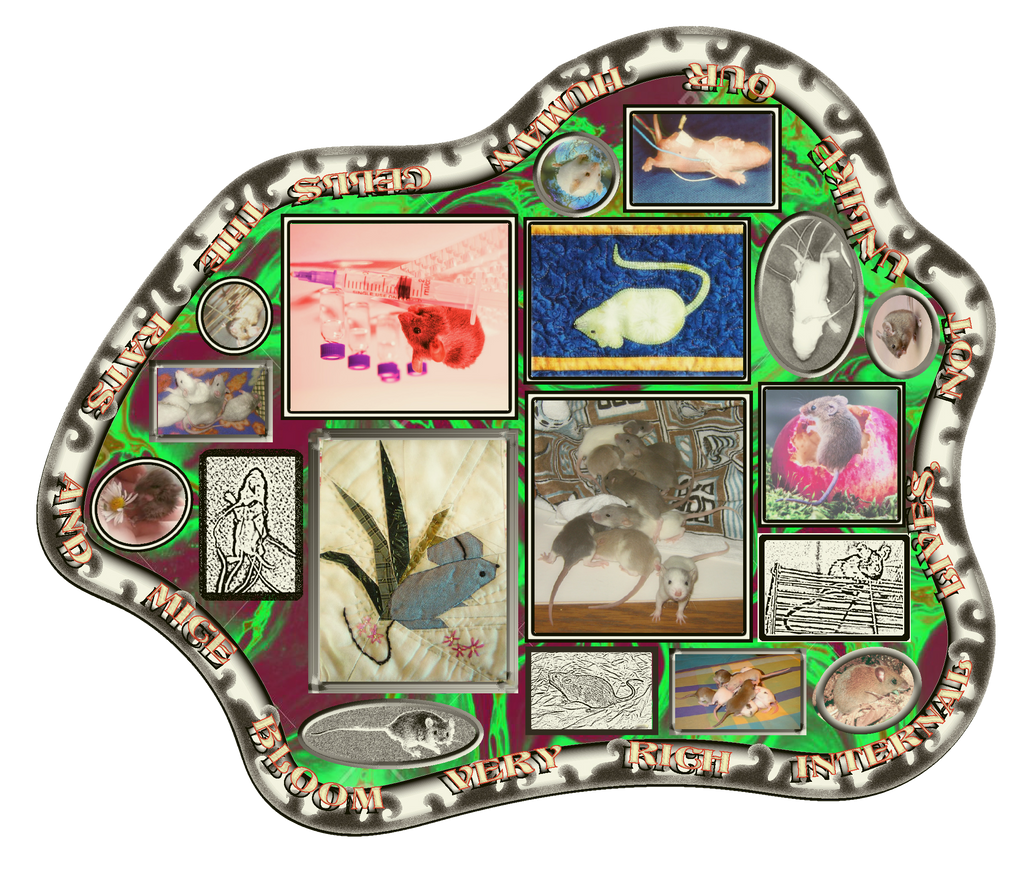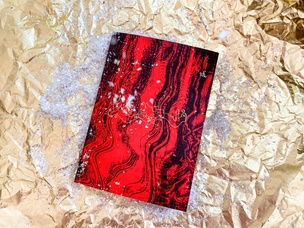Digital print on velvet with light splatters of gelatin.
Transgenic Test Subjects is a textile work by artist Sharona Franklin produced as a sculptural element for Limeflower Heterodoxy, her livestreamed installation at grunt gallery. Franklin uses images of mice as an entry point through which the viewer steps into a world of discourse surrounding the vulnerability of children and animals, medical consent, and the ethics of biopharmacology. The text on the border reads: “The rats and mice bloom very rich internal lives, not unlike our human cells.” In likening the consciousnesses of humans and animals, Franklin and the pictured mice introduce several corollaries. Along with the “rich internal worlds’‘ of the rats and mice comes the capacities to feel, experience pain, and develop desires that surpass base survival instincts. Franklin approaches the ethical consequences of this from a place of nonjudgement—some of her own treatments are chimeric medication rely on stem cells from mice. Rather, Franklin’s work operates both as a tribute to lab mice and a site where the viewer may bear witness to their multiplicity of experiences, including degeneration—this mirrors the decay of the gelatin bioshrine above the work laid flat, laden with paper mache tendrils that resemble rodent tails.
In Transgenic Test Subjects, the mice also call forth the experiences of children given medical treatments and procedures over which they hold no control. Children and young adolescents do not have the legal power to offer or revoke consent to their healthcare, and the information they do receive often lacks full transparency between pharmaceutical company, doctor, and patient. Within this environment of defenselessness, youth experience their inner worlds and cultivate modes of coping that medical language cannot always name and culturally is not often represented. Within the paradigm of the initial quotation, it follows that rats and mice, too, are coping without an emotional blueprint. The children and the mice exist in positions that echo each other; they create resonances across different points in the timeline of biomedical and pharmaceutical production and consumption. In this textile work, Franklin traces a variety of subjectivities—both quantifiable and inarticulable—within structures of medicalization. The tableau is a blueprint, a family photo album, a collection of images united in subject matter and differentiated by their aesthetic registers.
The work will be available at the close of the artist’s installation Limeflower Heterodoxy at grunt gallery in Vancouver. Throughout the installation, the gelatin will decay and drip onto the work, marking elapsed time, and evidencing the textile’s role within the bioshrine.
The livestream will be available starting 6/5/2020. You must have a Printed Matter username and password in order to access this edition.
Please Note: The work will be available after the duration of the installation and ready to ship by the end of July.
Sharona Franklin b. 1987 is a Canadian multidisciplinary artist, writer and advocate. Her work explores radical therapies, cybernetic craft, ecological systems, bio-ritualism, pharmacological and social inter-dependency disseminating mythologies of class and biocitizenship within disability. Franklin’s visual media practice can be viewed through social media platforms @paid.technologies, @star_seeded and @hot.crip. Through ontological study and utilizing natural, salvaged, biodegradable, edible, print media and digital mediums, her psychedelic works invite the viewer into facets of biopharmaceutical investigations and educational community practice.
Recent exhibitions include Kings Leap, NYC, Unit 17, Vancouver, Canada, G44 Center for Contemporary Photography, Toronto, Canada, New Image Art Gallery Los Angeles, CA, and Flux Factory, New York, NY. Recent publications include Injustice in Biopharm, 2019, Cassandra Press and Rental Bod, 2016, Peace Library Publications


















![Sempre Milanese [Third Updated Edition]](https://cdn.filestackcontent.com/api/file/CYJLY7E4QdORCaXHDSuS/convert?fit=max&h=480&w=304&compress=true&fit=max)





